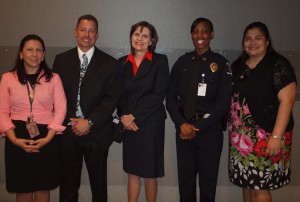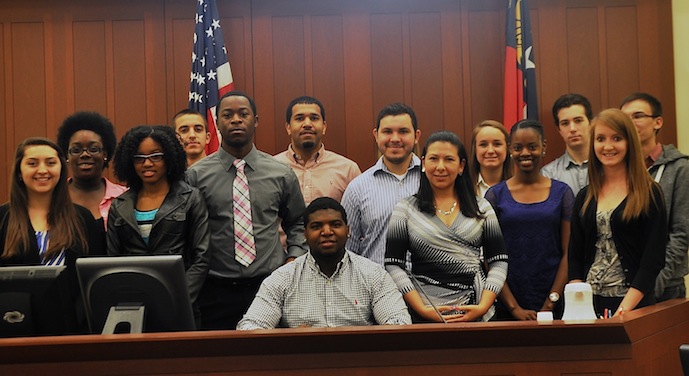Students in Susana Cisneros’ Spanish for Law Enforcement class last spring witnessed police in action, talked with FBI agents and observed court trials – gaining real-world insights into how Spanish is used in the criminal justice system. Because of students’ positive experiences, she plans to continue to offer these types of opportunities for students.
Cisneros, a lecturer in the Department of Languages and Culture Studies, organized three extra-credit activities for students. She arranged ride-along opportunities with the Charlotte Mecklenburg Police Department, a bilingual tour of the Mecklenburg County courthouse and a panel of Spanish-speaking law enforcement professionals.
At first, Cisneros only offered students ride-alongs, but decided to expand the offerings to include bilingual courthouse tours. She quickly determined an issue she needed to address. “What happens with students without cars?” Cisneros said.
To solve this problem of students being unable to make it to the courthouse, Cisneros brought the law enforcement community to the students by starting the Spanish legal panel. The panel comprised trial court administrators, police officers, FBI agents, and other criminal justice officials who spoke about issues they face in their professions and explained the advantage of speaking Spanish in the workplace.
Students Recount “Amazing” Opportunities
Students described the ride-alongs as amazing experiences, Cisneros said. She only required students to ride for four hours, but some stayed for 12 ½ hours.
“One girl who helped officers pick up bullets said, “Oh my God, it was amazing. I stayed till 10:30 picking up bullets.”” Cisneros said. She said another student helping at a crime scene found a knife.
Cisneros said students who completed a ride-along or interacted with the panel will have a mentor they know and can talk to should they join CMPD or the FBI.
“My goal is for students to have jobs when they finish college,” she said. “If I can get them into that position, that is what I will do. I am absolutely happy that they’re taking advantage and being proactive with their own lives, to see them strive, to be successful and contribute to society.”
 Student Laura Bizzell found that the activities expanded upon classroom lessons. “These opportunities showed firsthand the criminal justice procedures learned in class,” Bizzell said.
Student Laura Bizzell found that the activities expanded upon classroom lessons. “These opportunities showed firsthand the criminal justice procedures learned in class,” Bizzell said.
She completed all three activities, and enjoyed riding with a female officer during a midday shift.“First I did the ride-along,” she said. “I had always wanted to do one since I was in high school. We ended up going uptown to the law enforcement center and had to serve a warrant on someone. She arrested him.”
Another student, Kinsey Vancil, said that participating in the ride-along and hearing the legal panel helped her come to a career decision.
“Honestly, I wasn’t sure what I wanted to do exactly in criminal justice until I went on the ride-along and went to the panel,” Vancil said. “The panel made me realize that I might want to be a part of not only the court system, but that I might also want to be in the FBI one day.”
She said going on the ride-along also helped her realize that she wants to work on domestic violence cases and with inmates in the criminal justice system.
For Annika McHenry, taking the bilingual tour was an opportunity to learn what goes on in a courthouse.
“The tour also really showed me the need for bilingual professionals in the courthouse and their impact on the citizens of Charlotte,” McHenry said. “My favorite part of the tour was being able to sit in many different trials and see how a real trial works.”
McHenry also attended the Spanish legal panel, and said it helped her consider how she could use her education. “The panel was a great way to learn about what it is like to work at the courthouse, at CMPD, and in the FBI,” she said. “Many of my questions were answered from each of the representatives from each department as well and gave me an idea of ways to use my major in the future.”
Hearing the legal panel inspired Daniel Decourto to focus more specifically on his career path. “Before I participated, I was not sure what I wanted to do in the criminal justice field,” Decouto said. “I was planning on becoming an investigator for defense attorneys or an officer for CMPD, but after the panel, I decided that I wanted to become an agent for the FBI.”
After completing the extra-credit activities, Bizzell decided she wants to go to law school and possibly become a prosecutor. She encourages other students to consider these types of experiences.
“If you have opportunities like this, take them,” she said. “You never know what you’re going to get out of it. You should definitely take advantage of anything that is put in front of you.”
Words by Bryant Carter, communications intern.
Photos of students in the courtroom and of the legal panel provided by Susana Cisneros.








